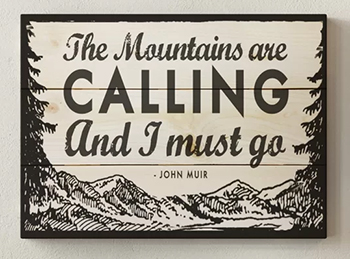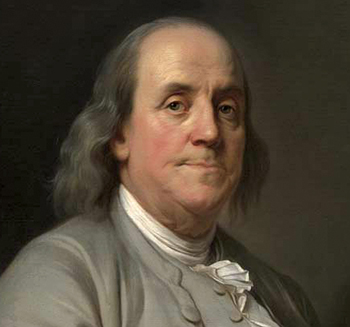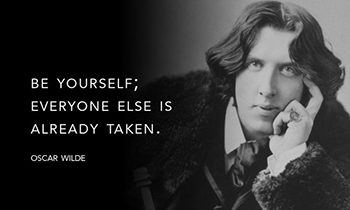Quotes That Are Quoted Totally Incorrectly

As Maya Angelou famously opined, "Please Google quotes attributed to me in case they actually came from an Olive Garden children's menu." Words wield far more power when attributed to someone wise, even if that wise person never said anything like it (or was actually trying to make the exact opposite point). Remember the truth behind the following quotes the next time you see them slathered on an inspirational meme ...
"Journalism Is Printing What Someone Else Does Not Want Printed; Everything Else Is Public Relations" - George Orwell
This powerful quote gets plastered on social media by people decrying the obvious bias displayed by Fox News or MSNBC, or when nerds are mad at Kotaku for some confounding reason. At its worst, it's used to immediately dismiss any news story with a conclusion the reader doesn't like. In its more highbrow moments, it's employed by protestors or newspaper columnists condemning attempts to control White House reporters. It was even listed as a quote that predicted life in the futuristic American dystopia of the year 2014, and it came with a picture of Orwell's signature so you know it's legit. Truly these are wise words from a man who dedicated his life to warning us about how power can be abused.
Except there's no record of Orwell saying anything like it. A similar version is attributed to William Randolph Hearst, who popularized crap journalism with stunts like breaking out of a prison and starting a goddamn war, but while giving the quote to him can lend your anti-media rant a darker "The news has always been terrible!" edge, there's no evidence connecting the quote to him either.
Don't Miss
The earliest words resembling this quote appear to be from 1918 and can be traced to L. E. Edwardson, whom you have not heard of. He was an editor at the Chicago Herald and Examiner, and it's funny how the quote loses most of its force when the person who said it is just "some guy." And when you look at the actual quote's wording, you pick up a few differences that reveal how the popular version is rather sanctimonious.
Edwardson's quote is "Whatever a patron desires to get published is advertising; whatever he wants to keep out of the paper is news." Because yes, when someone who pays the paper requests that you publish something about them, that is advertising, and when someone wants the truth hidden, that is often newsworthy. But it's a huge jump from there to say that journalism consists exclusively of things people want to keep out of the papers. No one tried to silence "Futures gain on hopes of U.S.-China trade deal," but we're pretty sure that's newsworthy journalism, not PR for "everyone who participates in the economy."
"The Definition Of Insanity Is Doing The Same Thing Over And Over And Expecting Different Results"-Albert Einstein
This quote has been attributed to so many speakers that there's probably someone out there who's convinced it was coined by the Far Cry 3 villain, but Einstein seems to get the most credit for it, ol' Al being somewhat well known as a smart fellow. It's a great stock line to bust out when you want to criticize someone for sticking to a strategy, and it's often used to call out politicians. Throw the phrase into Google News and you'll probably find someone who attributed it to Einstein within the last few hours. And, of course, the quote goes great alongside pictures of Al looking super serious.

Einstein never said it, and why would he have? Why would any scientist? A lot of scientific experimentation consists of doing the same thing many times, not necessarily because you expect different results but because it's possible that you'll get different results, at which point you have to revise your thoughts accordingly. And of all famous scientists, it might be silliest to attribute the quote to Einstein, who kind of invented quantum science. Isn't quantum science about outcomes being variable and unpredictable in a way no one had previously understood? That's not a rhetorical question; our knowledge of quantum physics mostly comes from watching Quantum Leap.
As for the true origin of the quote, the exact words appear to be from a 1983 novel called Sudden Death. Not only did it come out nearly 30 years after Einstein's death, but it's a thriller set in the world of women's tennis. Not that there's anything wrong with that, but it's hardly the authority people are picturing. Author Rita Mae Brown appears to have been paraphrasing a slogan from a Narcotics Anonymous textbook, and that book's wording included an important change: insanity is repeating a mistake. The message here is warning against futile action and self-harm, not stubbornness. There are plenty of times when it's a good idea to keep trying the same thing over and over, just not when the thing you're doing was a godawful idea to begin with.
"The Mountains Are Calling, And I Must Go"-John Muir
John Muir was an avid outdoorsman, and his words are a classic call to adventure. It's a motto for anyone who likes to escape the daily grind with a hike, and it appears on countless motivational posters showing tempting trails and relaxing cabin getaways.

A truncated version has even been commandeered as a Coors Light slogan, because someone in their marketing department wanted to get out early on Friday and remembered that their can has mountains on it. Their ads encourage you to blow off work, hit the slopes, and relax with a nice cold can of their flavored water.
Now, John Muir did indeed write those words in a letter to his sister, but the "Fuck your budget meeting, you could be snowboarding right now!" interpretation leaves off a key clause. The full sentence is "The mountains are calling and I must go, and I will work on while I can, studying incessantly."
Muir was a dedicated naturalist, and, for him, trips into the mountains weren't about napping under trees as a form of emotional therapy. They were intense work, both physical and academic. The full letter is about how he's exhausted from a grueling five-week trip, but that he'll be back out there as soon as he can. He was a dedicated geologist, botanist, and glaciologist, and when he wasn't studying, he was writing or advocating for conservation efforts.
Muir loved being out there, sure, but when the mountains are calling, that's not a call to relax and drink beer. It's a call to pursue your vocation no matter how hard it gets, and in the name of scholarship, not just personal fulfillment. The mountains may call for you to forsake pleasure and subject yourself to great discomforts, although in that sense maybe it's a fitting slogan for Coors Light after all.
"Those Who Would Give Up Essential Liberty, To Purchase A Little Temporary Safety, Deserve Neither Liberty Nor Safety" - Benjamin Franklin
Benjamin Franklin's timeless quote is the ultimate patriotic smackdown. Whether it's in response to a proposed tax hike or the suspension of rights in an emergency, any suggestion of giving the government more authority can be countered with this reminder that we're forever teetering on the edge of a police state. Franklin may not have predicted modern technology, but surely he would agree that no amount of protection from terrorists is worth having NSA employees know your porn history.

"I think I know what Ben Franklin's opinion on your tyrannical government overreach would be..."
Like Muir, Franklin did write those exact words. And, like Muir, the context of those words was discarded the moment someone decided they made their cause sound cool. Social media wasn't exactly a thing during Franklin's time, so people didn't have to worry about Uncle Sam knowing what you jerk it to. Instead, people were worried about getting killed in raids during the French and Indian War, before America was even a country.
The Province of Pennsylvania was ruled by, in what is truly a remarkable coincidence, the wealthy Penn family. Because of the whole people trying to kill each other in their territory thing, the Pennsylvania General Assembly wanted to tax the Penns for the war effort. But the Penns, like many Americans, thought "paying taxes" was nonsense, and instead offered the Assembly a one-time payment in exchange for a ruling that said the Assembly lacked the authority to tax them. When Franklin said "purchase a little temporary safety," he meant it literally, while the "liberty" part referred to a people's ability to band together and defend themselves, not the personal freedoms we associate the word with today.
Franklin was very much in favor of giving the government the authority to manage a crisis. The full letter makes it obvious that Franklin's beef is with money, but skip forward to the 1940s, and the quote was being plucked out of that letter as a rallying cry for small government libertarians, which is the exact opposite of the point Franklin was making. At least he got the last laugh on Thomas Penn, who was forced to pay taxes.
"Ever Tried. Ever Failed. No Matter. Try Again. Fail Again. Fail Better."-Samuel Beckett
This quote is a juiced-up version of the familiar "try, try again," replacing the old assurance of boring repetition giving way to some distant final success with the much more encouraging idea that each failure will be better than the last. Athletes have the lines tattooed on themselves; Peter Dinklage used it in a motivational speech; the news says it when talking about sports, science, and inspirational scarves. It's especially popular in Silicon Valley, where it's bellowed out by people like Richard Branson. It certainly sounds convincing coming from the tiny percentage of entrepreneurs whose initial failures did eventually give way to massive success.
But what work of Samuel Beckett's does it come from? Does placing it in context make it even more inspirational? Here's the paragraph that precedes it, so prepare to have your inner fire stoked.
"Say a body. Where none. No mind. Where none. That at least. A place. Where none. For the body. To be in. Move in. Out of. Back into. No. No out. No back. Only in. Stay in. On in. Still. All of old. Nothing else ever."
Uh ... maybe the bit that comes after the inspiration makes more sense?
"First the body. No. First the place. No. First both. Now either. Now the other. Sick of the either try the other. Sick of it back sick of the either. So on. Somehow on. Till sick of both. Throw up and go. Where neither. Till sick of there. Throw up and back. The body again. Where none. The place again. Where none."
Not ... not quite. "Worstward Ho" is an aggressively inscrutable piece of prose. It is, to put it mildly, open to interpretation, but at the very least it has a darker message than "Just keep at it, champ!" The narrator has always tried, and they've always failed.
As for Beckett's wider beliefs, well, it's true that he often wrote about failure, but he didn't do so with a lot of optimism. "Despair young and never look back" is another axiom of his. He's been remembered as a " gloomy and merciless author" whose writing was " fearlessly bleak." In other words, not the kind of guy you use to inspire your start-up employees as they enter a fourth month of not being paid. Man, who could have thought that the guy who wrote Waiting for Godot was actually a bit of a downer? But to dumb it back down to our level, quoting Beckett as an optimist is like looking to the future with "As Phillip J. Fry once said, 'Here's to another lousy millennium!'"
"Be Yourself; Everyone Else Is Already Taken" - Oscar Wilde
"Be yourself" is a delightfully useless piece of advice. The implication is that, without this sage wisdom, you'll imitate the worst among us and turn to terrible vices like cigarettes and jazz music. "But what if I try to emulate someone I admire?" you might ask, and that's when the cutesy second part of the aphorism comes into play. "But 'everyone else is already taken' doesn't make any sense," you might say. "People can share broad qualities, so if I see a role model, I can try to mimic their habits to ..." But then your mentor will shush you. "It's an Oscar Wilde quote," they'll explain, ending the discussion.

Ruby Rose used it in an interview about playing a queer character on TV. A prosecutor from South Carolina who pleaded guilty to corruption charges quoted it in a blog post, approaching Kevin Spacey levels of bizarre. PBS said the line "might well serve as credo" in an article, ironically, about debunking Wilde myths. Someone even put out a motivational book called Be Yourself, Everyone Else Is Already Taken, and if you can't trust motivational authors then who can you trust?
Wilde never said it. The closest quote of his is "Most people are other people. Their thoughts are someone else's opinions, their lives are a mimicry, their passions a quotation." Which we guess could be interpreted as a push for you to break that pattern, but it also says that people are often other people. So no, it's not true that everyone else is already taken. The existing allotment of people to people has no effect on your ability to change your personality.
Wilde was in fact pretty open to styling yourself as someone else. You kind of have to be sometimes. Take a look at another real observation of his: "Man is least himself when he talks in his own person. Give him a mask, and he will tell you the truth." Translate this into something with less wit and he's telling you not to be yourself, because you'll lie. Basically, Oscar Wilde would have been a big fan of anonymous comment sections full of people posting as gimmicky characters.
"Be The Change You Wish To See In The World" - Gandhi
This is the perfect quote to throw on a poster and inspire everyone around you in a vague, non-threatening manner. You could even get it as a tattoo because, when it comes to famous figures, Gandhi is someone who probably did nothing you wouldn't want to permanently tie yourself to. And you can always throw this bad boy out there to show that you too agree that good things are good, whether you work in politics, movies, education, or PR. Just don't attribute it to Mohandas Gandhi, because there's no record of him saying it.
We only think Gandhi said it because his grandson, Arun Gandhi, told people he thinks he heard grandpa Mahatma say something sort of like it. Considering what an important historical figure our favorite Civilization player was, you'd kind of expect a higher level of documentation than that.
Would Gandhi have endorsed the words? Well, again, the literal meaning of the phrase is "Do the things that you think are good things to do," and you'd be hard-pressed to find anyone anywhere who disagrees with such a broad sentiment. The Nazi Party could have put it on signs in their beer halls and nodded in approval. But the closest thing Gandhi actually said was "If we could change ourselves, the tendencies in the world would also change. As a man changes his own nature, so does the attitude of the world change towards him." In other words, people respond to you based on your actions, which isn't quite the same as the whole world magically changing based on your unseen example.
The other interpretation of the fake quote is that change is all about individual action. You have to do what needs to be done, regardless of what the rest of the world thinks. Which is strange to associate with Gandhi, because his movement succeeded thanks to huge numbers of people carefully coordinating their actions because they knew they couldn't accomplish much as individuals. We'd lay out the specific strategy Gandhi's followers used to create change in the world, but it wouldn't fit on a bumper sticker, so what's the point?
FollowRyan MenezesonTwitterfor bits cut from this article and other stuff no one should see. Abraham is a Mexican lawyer. You can say hi to him on Twitterhere, or follow him on Wattpad to read some of his upcoming original storieshere.
Top Image: National Portrait Gallery